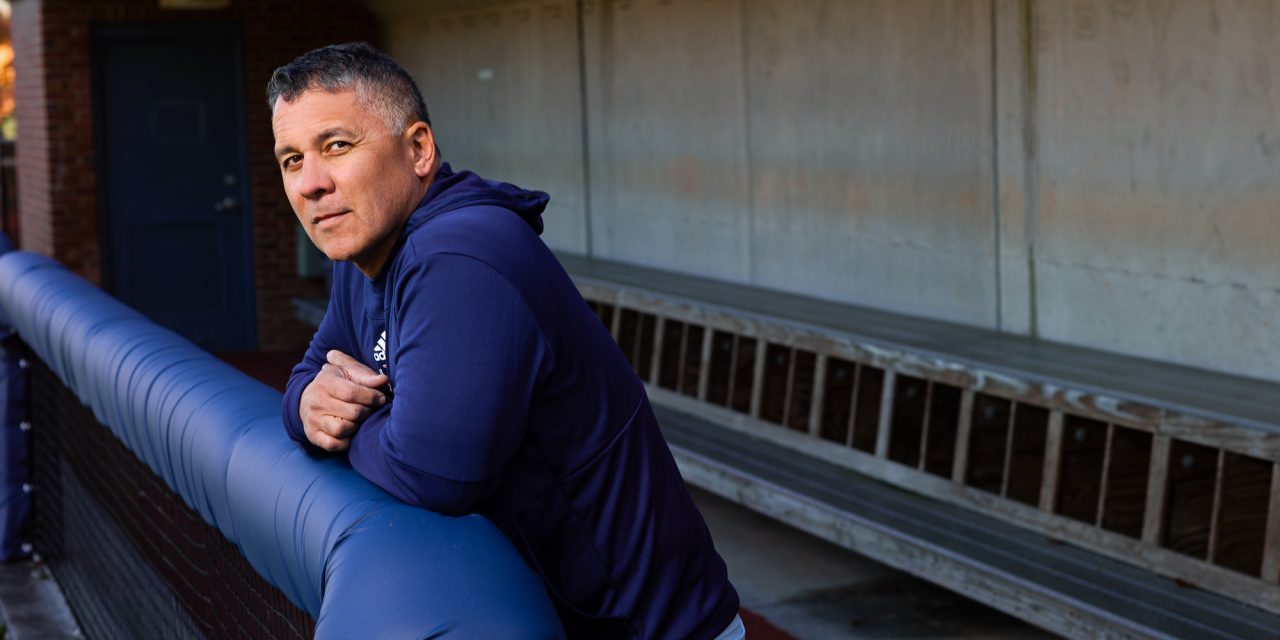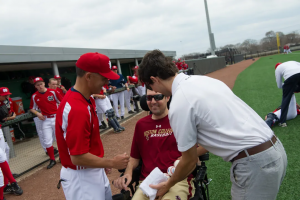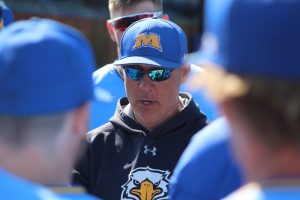
Going the Distance

Mik Aoki ’86 began his love for baseball as a young boy in Japan. Over his many years as a coach, he’s come to appreciate the important life lessons his profession has to offer.
Story by Ken Shulman
Photographs by Jimell Greene
Mik Aoki ’86 has spent a lifetime on the baseball diamond, as a player and as a coach. Yet he rarely spoke about the game with his mother. “For my mother, studies always came first,” says Aoki, who recently took over as head baseball coach at the University of Richmond. “She never discouraged me. But I think she would have been just as happy if I had taken up the tuba.”
Aoki’s Japanese father met his American mother on a blind date while studying in New York City. Aoki was born in Yokohama, Japan, in 1968 and first learned to play baseball in the courtyard of his family’s apartment complex in Tokyo. “We played wiffle ball at first,” he says. “And then we played with rubber baseballs called kenko balls. I used to throw that kenko ball against the apartment building wall, and then over the balconies, over the fifth floor, sixth floor, seventh floor. Eventually it wouldn’t come back, and I’d have to climb all those stairs to get it.”
Along with how to throw—and how to run stairs—Aoki learned resilience in that Tokyo courtyard. “I was the only non-Japanese kid in the complex,” he recalls. “The other kids picked on me. Sometimes there were fights, and I used to run home to my mother. And every time I showed up, she told me that if I wanted to come inside, I could. But if I did come inside, I’d have to stay inside for the rest of the day. I’d cry for a while outside our apartment and then head back to the courtyard.”
In 1976, when Aoki was just eight years old, his father passed away at the age of 38. The following year the family of three—Aoki, his mother, and his younger sister Naomi ’88—moved across the ocean to Plymouth, Massachusetts, where his mother had grown up. At nine years old, starting fourth grade in a new school and a new country, Aoki once again felt like an outsider. “I’d been a gaijin—a foreigner— as a kid in Japan,” he recalls. “And now here I was in Plymouth, this half-Japanese kid everyone was curious about.”
But Aoki wasn’t an outsider for very long. He was bigger and stronger than most of his classmates, and a very good athlete. “Sports definitely helped me fit in,” he said. “I played baseball and basketball, I swam, and I learned how to play soccer and tennis.”
It seemed that Aoki had found a home at his public school. But the Plymouth-Carver school district was facing some tough times, with a shrinking tax base and a new Massachusetts tax law (called Proposition 2½) that further cut already sagging real estate tax revenues. Plymouth-Carver High School, which Aoki was slated to attend the following fall, was holding double sessions. There was even talk of the school’s losing its accreditation.
“This caused a serious migration of students,” Aoki says. “Many of them ended up at nearby private schools. And I ended up at Milton.”
At Milton, sports helped Aoki fit in and make friends, just as it had at his elementary school. He played offensive line on the football team and shortstop—with a few stints as a pitcher—on the baseball team. “I also wrestled, incredibly poorly, for three years, before going back to basketball my senior year,” he says with a laugh.
At Wolcott House, where he lived for four years, he found a mentor in the house head, Tom Flaherty, who also coached Aoki in football, baseball, and wrestling. “Tom was definitely the most influential person in my life at Milton,” Aoki says. “He was extremely patient, but at the same time he expected you to do your job at the highest level. If you made a mistake during practice or on the field, he didn’t light you up like a Christmas tree. He made that mistake into a learning moment.”
For Flaherty, who retired from Milton in 2008, it was clear that Aoki had the right stuff to succeed in sports and succeed at Milton. “He was a good athlete,” Flaherty remembers. “And he was a leader, the captain of our team, and the head monitor of the dorm. But what most impressed me about Mik was his consistency. He was always the same steady Mik, so sound and approachable, always reaching out to the other kids. And he’s that same person today.”
After four years at Milton, Aoki enrolled at Davidson College in North Carolina, where he majored in English and played four years of varsity baseball. “I think Milton prepared me very well for college,” he says. “If I have any ability to write, and I think I do, that came from Milton. I also learned to think analytically and how to make decisions there.”
Aoki spent his first summer after college playing baseball just outside Amsterdam, in The Netherlands. Then he accepted his first coaching position at a community college near Hartford, Connecticut. “I think I made $1,400 for the year,” he laughs. “I needed to work all sorts of side jobs to pay for my coaching habit.”
In 1994, Aoki got what he calls his first “real job”—as assistant baseball coach at Dartmouth College. There he met the woman who would become his wife, Sue Daddona, an assistant coach on the women’s field hockey team and a former field hockey and lacrosse standout at the University of Delaware. The two stayed at Dartmouth until 1998, when Aoki was hired as head baseball coach at Columbia University. They married in 2001 and moved in 2003 from Columbia to Boston College, where they spent seven years.

Coach Aoki with Pete Frates, center, and Frates’s brother, Andrew, right, at an ALS awareness game at Boston College in 2014. Frates, a former baseball captain at BC where he played for Aoki from 2003 to 2007, was diagnosed with ALS in 2012. He died in 2019. The Ice Bucket Challenge, which Frates and a friend created in 2014, raised over $250 million for ALS. “Pete was the engine behind it because of the type of person he was,” says Aoki, who remains close to the Frates family. Aoki will be holding an ALS awareness game at Richmond in May in honor of Pete and his family. “They’ve done more to move the needle toward a cure for ALS than any family in the history of the human race.”
“I loved our time at Boston College,” Aoki says. “Massachusetts was home. All three of our children were born while we were at BC, and all three were baptized by the same priest there.”
Aoki’s players at Boston College also have fond memories of their time with him. “People talk about tunnel vision,” says Harry Darling, who played for Aoki for four years at BC. “Mik has something called “tunnel emotion.” He’s consistent day in and day out. You always know what you are going to get from him. That makes him easy to trust. So when he gives you a compliment, you know he means it. And when he gets on you for a mistake, you know there’s a reason why.”
From Boston College, the family moved to South Bend, Indiana, in 2010, when the University of Notre Dame hired Aoki as head baseball coach. They stayed there through 2019, when Notre Dame informed him that his contract would not be renewed. Being let go shook Aoki’s confidence. He even considered leaving coaching. “I thought about other options almost every night,” he remembers. “Had this happened 15 years earlier, I might have reacted differently. But this time I had three kids to think about.”
 Fortunately, Aoki was able to stay in coaching. He found a new job at Morehead State University, a Division 1 school in eastern Kentucky. “It was very different from what I’d known at Columbia or Dartmouth or Notre Dame,” he says. “The program and school weren’t resourced at anywhere near the same level. The university is a regional school serving eastern Kentucky, which is not a very affluent area. There were a lot of first-generation college students, and I’d not had much experience with that type of environment. On the team, we had great kids who worked and practiced hard. I learned a lot from them and the experience at Morehead.”
Fortunately, Aoki was able to stay in coaching. He found a new job at Morehead State University, a Division 1 school in eastern Kentucky. “It was very different from what I’d known at Columbia or Dartmouth or Notre Dame,” he says. “The program and school weren’t resourced at anywhere near the same level. The university is a regional school serving eastern Kentucky, which is not a very affluent area. There were a lot of first-generation college students, and I’d not had much experience with that type of environment. On the team, we had great kids who worked and practiced hard. I learned a lot from them and the experience at Morehead.”
In the spring of 2023, the University of Richmond reached out to Aoki; it had decided to make a coaching change. “I’d visited that campus when I was looking at colleges,” he recalls. “I remembered it as a place that offered a great balance of education and athletics. And besides, the current president is a Red Sox fan. I decided to take the job.”
Now in the fourth decade of his coaching career, Aoki can reflect on his trajectory from Yokohama to Milton to Richmond, on the lessons he’s tried to impart and the lessons he’s learned. “When I first started coaching, it was mainly that I wanted to stay connected to the game,” he says. “It wasn’t until much later that I realized what a tremendous impact you can have as a coach.”
Aoki wants to help his players learn to win and to excel both on and off the field. “It’s not just me teaching them to hit a slider,” he ex- plains. “There’s preparation—how you eat, how you sleep, how you compartmentalize your life on campus so you can be a student and an athlete. And how do you react when things go sideways, which they will always do. In this business it’s all too easy to focus on the outcome. And outcomes are important—even for me. If I don’t win enough games, I might be fired. But it’s equally important to win the right way. To understand the journey of trying to be great at something. Because that’s where the real life lessons lie.”
Ken Shulman has written about sports for Newsweek, The New York Times, The International Tribune, and National Public Radio.




